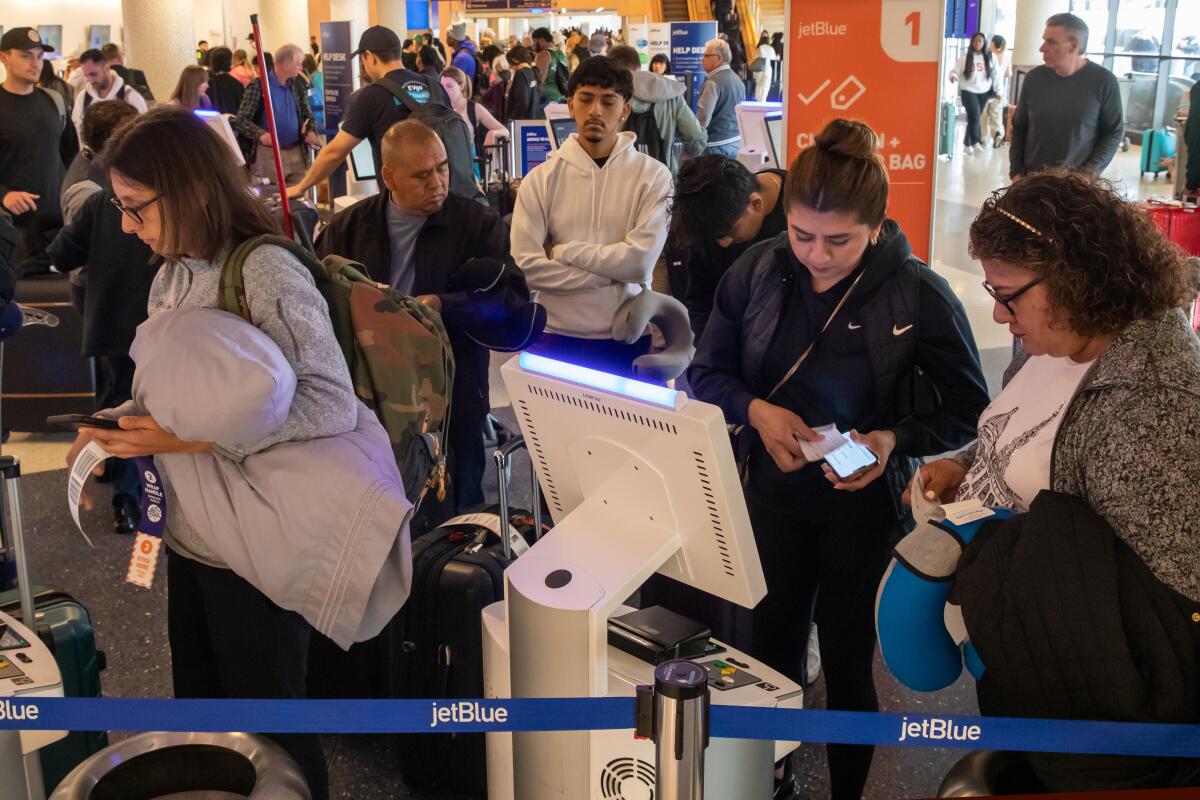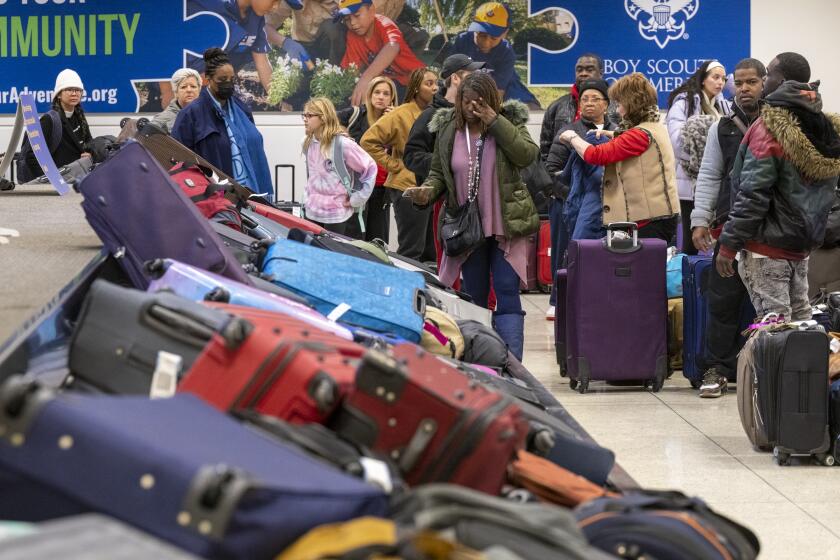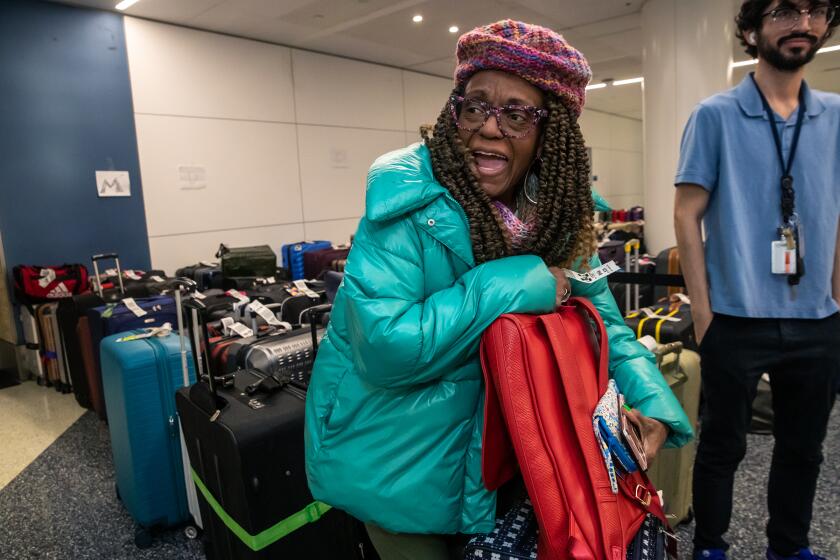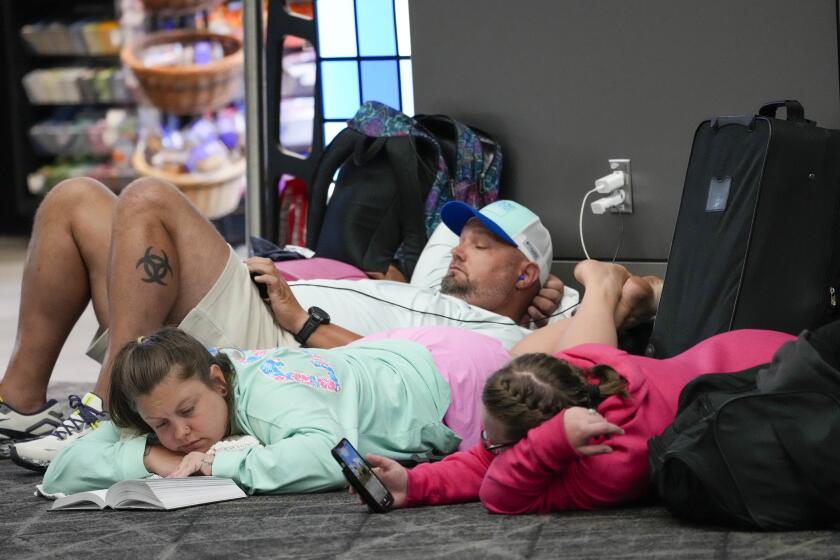Airlines are already strained, and LAX expects its busiest days in years for Fourth of July

Significant airline disruptions across the nation this week have many travelers bracing for the worst as the Fourth of July weekend approaches, months after a meltdown during the winter holidays left thousands stranded.
Passengers and airline experts are hoping the weekend won’t become a Christmas in July situation, or a repeat of last summer’s mayhem, when pent-up demand was compounded by staffing shortages at airlines and the Federal Aviation Administration.
“It’s going to be a real test,” said William McGee, a senior fellow focused on aviation for the American Economic Liberties Project. “We don’t want to see that repeated this summer, but already there are challenges.”
Beginning Thursday through July 10, Los Angeles International Airport is expecting some of its highest daily passenger counts since the COVID-19 pandemic began. And although the West Coast has been mostly spared of the worst of this week’s airline issues, the number of cancellations at LAX as of noon Wednesday was above average at 28, said airport spokesperson Sevag Mahserejian.
Thousands of travelers have been stranded at airports or stuck on hold trying to rebook flights as a massive storm snarled travel in the U.S. and Canada.
Across the U.S., delays and cancellations continued to rise throughout the day, with more than 5,000 U.S. flights delayed and nearly 1,000 canceled by Wednesday afternoon, according to flight tracker Flight Aware.
The most significant issues were at United Airlines, which had canceled about 18% of its flights, according to Flight Aware. More than a quarter of United flights didn’t take off Tuesday.
The airline blamed lingering thunderstorms in the Northeast and an ongoing shortage of FAA air traffic controllers for this week’s issues. United’s New York-area hub, Newark Liberty International Airport, as well as another key United stop, LaGuardia Airport, led all U.S. airports in cancellations Tuesday and Wednesday.
“As we focus on helping our customers whose travel has been disrupted over the last few days, we’re also planning ahead to be ready for the upcoming holiday weekend,” United officials wrote in a statement to The Times.
McGee said he’s hopeful United can recover for the weekend but added that the airline needs to take some responsibility for the disruptions, pointing to concerns raised by its flight attendant union about internal scheduling issues.
A combination of bad weather, outdated technology and vulnerable flight schedules played into the mess at Southwest Airlines.
“I don’t think that we’re going to be looking at the same situation that we saw with Southwest” this winter, McGee said.
Still, lingering complications such as the shortages of pilots and air traffic controllers as well as record-high bookings leave little room for error, he said.
“There are going to be challenges,” McGee said. “It’s going to be an interesting summer.”
Nearly 3 million passengers are expected to travel in and out of LAX during a 13-day period around the Fourth of July. The busiest travel days are expected to be Friday, with about 245,000 passengers, and July 10, with about 251,000 passengers — surpassing counts from last Thanksgiving and Christmas, though still less than pre-pandemic totals from 2019’s Fourth of July weekend.
“The busy summer travel season is upon us at LAX and we expect passenger volumes to reach the highest levels we have seen so far this year,” Justin Erbacci, chief executive of Los Angeles World Airports, said in a statement.
Air travelers have been putting up with widespread delays all month, and it’s getting worse as bad weather rakes the Northeast.
About 90,000 vehicles a day are expected at the airport, meaning slow-moving traffic and a shortage of parking. Airport officials recommend arriving extra early for flights, reserving parking spaces or taking alternative transportation.
Thunderstorms probably will continue to be an issue through the holiday travel period, McGee said, and airlines need to be prepared.
“That’s what happens in the summer … but how are you responding to it? That’s the real question,” McGee said. “The airline industry as a whole has not done well in recent years.”
More to Read
Sign up for Essential California
The most important California stories and recommendations in your inbox every morning.
You may occasionally receive promotional content from the Los Angeles Times.














